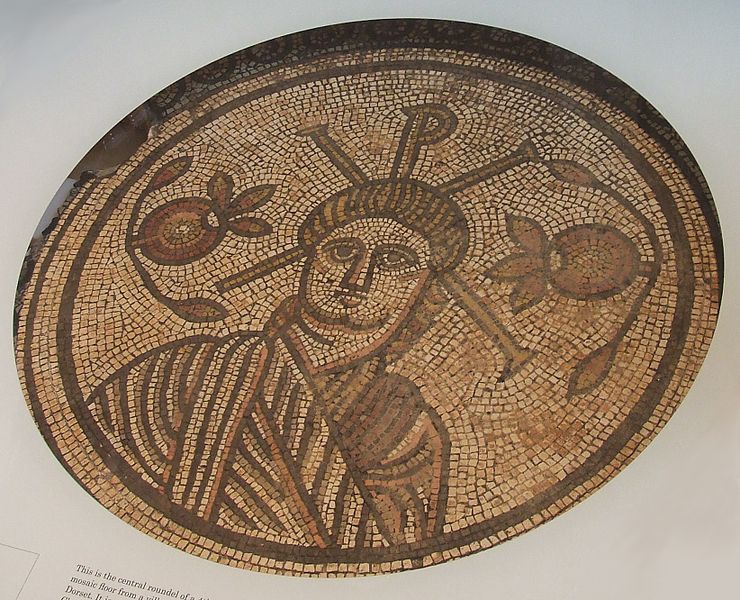
 |
Freethought & Rationalism ArchiveThe archives are read only. |
|
|
#1 | |
|
Contributor
Join Date: Mar 2003
Location: London UK
Posts: 16,024
|
Quote:
Apollo? |
|
|
|
|
|
#2 |
|
Veteran Member
Join Date: Nov 2011
Location: UK
Posts: 3,057
|
It is not for nothing that the period after the fall of Rome until the Renaissance has ever since been called dark. Presumably, these jumped up, politically inspired 'scholars' who disagree are going to rename the Renaissance, too? Or have they not had the bare wit to think things through?
Or have they simply not finished their education, yet? |
|
|
|
|
#3 | |||
|
Contributor
Join Date: Mar 2006
Location: Falls Creek, Oz.
Posts: 11,192
|
Quote:
Well there is certainly the image under the Vatican that is described as Apollo by some and Jesus by others. The depictions of Christ in the 4th century were emperor centric with the exception of those who revered the "Good (CHRESTOS) Shepherd".  This is the mosaic from the British Museum. http://en.wikipedia.org/wiki/Hinton_St_Mary_Mosaic Quote:
And the way I see these "Dark Ages" is in the suppression of the Greek intellectual tradition. The light of knowledge - mathematics, geometry, astronomy, science, medicine, literature, philosophy .... - this light was switched off by the Christian regime. The rise of faith and the fall of reason according to Charles Freeman. The light commenced to return with the rediscovery of all these elements of the Greek intellectual tradition, by means of the preservation of this knowledge by the Islamic culture. |
|||
|
|
|
|
#4 | ||||
|
Veteran Member
Join Date: Nov 2011
Location: UK
Posts: 3,057
|
Quote:
|
||||
|
|
|
|
#5 | |
|
Contributor
Join Date: Mar 2006
Location: Falls Creek, Oz.
Posts: 11,192
|
The Closing Of The Western Mind: The Rise of Faith and the Fall of Reason (or via: amazon.co.uk)
Quote:
|
|
|
|
|
|
#6 | |||
|
Banned
Join Date: Apr 2004
Location: Alberta
Posts: 11,885
|
Quote:
So it was just a matter for time as Plato was looking for this man, but all he found was sophists:  Quote:
Quote:
So Plato was not looking for shining sophistry but for a sophist with a shine on him that would match the halo we put on Christ when he moved to Rome, and his mind has been ours ever since, i.e. the philosophic mind of Christ (and we call her Mary, just in case you wonder). It is a matter of 'seeing' Pete, and not empty sophistry. The problem really is, or was, that made the age so dark is that "the thousand year reign" had just begun, and so really the era of 'heaven on earth' itself was in its infancy, . . . ands now the real question is: seeing what? with no relevant history in its own past. So now you can say that the dark age is called dark only because it held a promise to unfold that makes heaven worth its while (instead of just Essenes gallivanting about in their own Elysian field), since knowledge is and will accumilate to built higher highs in all directions, i.e. "you will do greater things."* Remember also Nathanael just came tumbling down a fig tree with no specific lineage classified to say that he really did not belong as Joseph's brother James was claimed in Matthew, and in Luke, the real Jesus pegged his own lineage right back to God. The upshot here is that Rome has a copyright on heaven and that was something Emperor Constantine wanted to make known . . . and paved all roads in truth to Rome, that will actually make people walk away from their gold like the magi did already then (even if dragging, kicking, screaming or otherwise, so I suppose). * A re-enter is required here wherein logos renews itself and thus will do greater things. So the actualization is neologically and must increase, simply because that is what par-ousia entails wherein the ousia's are current, as the shepherds were to Joseph, and they looked in and understood. Let me add that to say that "logos renews itself" may be a difficult concept to grasp. But if you go to Gen.1 you will read that truth (light) is prior to man. Then consider that we as humans are temporal and borrow our life from the mythology that itself is eternal and so is wherein we can have eternal life, it must also be true that we will be the continuity of infinity now with a son made manifest to identify man as both Lord God and God (and no longer 'the God of Abraham etc.), which then in turn is also why Plato was looking for a son to deserve that name (to be his equal, I suppose). http://www.roangelo.net/logwitt/sophist.html |
|||
|
|
|
|
#7 | |
|
Veteran Member
Join Date: Nov 2010
Location: Hawaii
Posts: 9,233
|
Quote:
|
|
|
|
|
|
#8 | ||
|
Veteran Member
Join Date: Nov 2011
Location: UK
Posts: 3,057
|
Quote:
|
||
|
|
|
|
#9 |
|
Contributor
Join Date: Mar 2003
Location: London UK
Posts: 16,024
|
Did anyone see the documentary I referenced?
|
|
|
|
|
#10 |
|
Veteran Member
Join Date: Nov 2011
Location: UK
Posts: 3,057
|
|
|
|
| Thread Tools | Search this Thread |
|